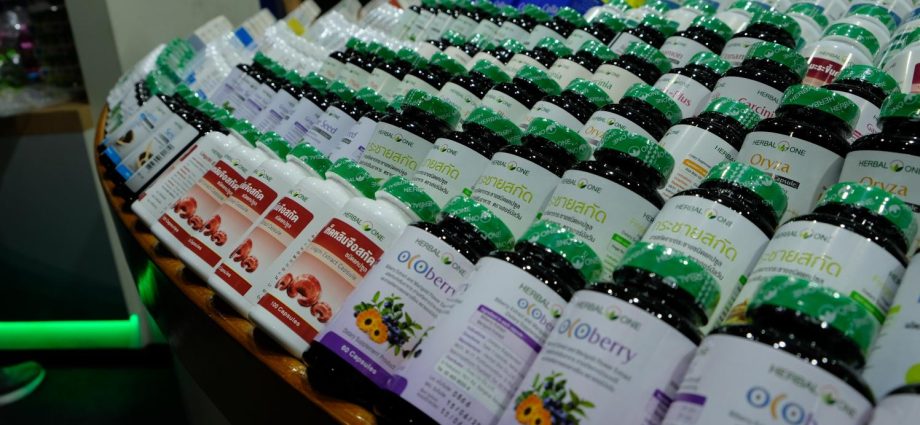
Crisis has turned into opportunity for Thai traditional medicine (TTM) as it has made wider inroads into the treatment of patients following the Covid-19 pandemic.
The definition of Thainess can be intertwined with various concepts from religious beliefs down to street food, and TTM is quickly gaining ground as an integral element of Thai culture, observers say.
Traditional medicine offers alternative treatments using diverse traditional herbs.
The 20th National Herbs Expo, hosted by the Ministry of Public Health from June 28 to July 2, showed use of Thai herbs has surged following the pandemic, just as industry professionals have claimed.
Despite some lingering scepticism surrounding herbal remedies, the expo drew numerous experts, entrepreneurs and visitors. It set the stage for people in the industry to exchange their knowledge and experience on the wonders of Thai traditional medicine.
Prior to the Covid-19 pandemic, herbs were mainly considered a dietary supplement or food rather than medicine, and the majority of TTM users were elders.
However, during the height of the pandemic stocks of medicine were limited as people began stocking up on medicine when the nation’s borders closed, resulting in a shortage of many modern medicines on which the country was heavily reliant.
Dr Pakakrong Kwankhao, head of the Thai Traditional and Herbal Medicine Centre at Chao Phya Abhaibhubejhr Hospital, said the shortage of modern medicine during the pandemic forced a shift in people’s attitude towards traditional treatment.
Dr Pakakrong noticed an increase in younger herbal medicine users as news spread about traditional herbs’ medicinal properties and their ability, in the eyes of some, to help prevent and treat Covid-19. More patients recovered using traditional herbs, which became an alternative to modern medicine.
According to Adisorn Pukanad of the Thai Traditional Medicine Foundation, TTM is easily accessible. Patients do not have to visit the hospital or need a doctor’s prescription to obtain the medicine.
“Although the efficacy may be lower, it is friendlier to health,” he said.
Herbal medicine is also consumed with greater ease in the form of capsules.
According to Herbal One company, which sells herbal medicinal products, most consumers aged 30 and above are starting to acknowledge the effectiveness of the capsules, along with their comparative advantages in price and convenience.
“Thai herbs don’t produce severe side effects because they are from nature. They come in several forms such as medicine, food, cosmetics,” he said, noting that modern medicine has a specific use and is designed mainly for treatment.
The TTM isn’t limited to consuma- bles.
Jua Inthan, a traditional massage therapist, said the herbal mixture contained in the luk prakob (herbal compress ball), a mainstay for massaging a person, can both be therapeutic and soothing. The balls are steamed before use.
The liquid from the herb can seep out of the luk prakob during massage and gets absorbed into the pores of the skin. That, coupled with the warm luk prakbo, is believed to enhance blood circulation, she said.
As the number of TTM users expanded, so did initial doubts about their efficacy and health safety.
Critics arguing against the TTM’s efficacy cited insufficient scientific evidence and laboratory findings for some herbal cures.

Shoppers look for bargains at the recent 20th National Herbs Expo hosted by the Ministry of Public Health. Thai medicinal herbs have gained in popularity over the years as an alternative treatment for patients with various ailments. Photos supplied by the expo
According to the critics, most of the knowledge about traditional herbs is derived from practitioners’ experience and often unverified historical records.
Dr Pakakrong said that 40 years ago, herbal doctors only accounted for about 2–3% of all medical professionals. The rest were modern doctors.
Herbs assumed the status of garden vegetables unworthy of being developed into health-safe and reliable medicinal products, so had an almost non-existent place in the hospital treatment of patients. In addition, medical schools primarily teach medical lessons rooted in Western knowledge.
At the Chaophraya Abhaibhubejhr Hospital, a group of professionals is conducting research to support the efficacy of herbs to cure diseases. Currently, the hospital is utilising herbs to treat patients with sleeping disorder and some chronic conditions.
To meet surging demand for herbal medicine, many hospitals and firms are collaborating with local farms to grow more herbs. The herbs that are not suitable for cultivation in a tropical climate will be purchased through import wholesalers.
In the promotion of Thai herbs overseas, the Department of Medical Science (DMS) has been conducting laboratory work to study the safety of herbs for consumers. The work focuses on the genetic toxicity of herbs under the Organization for Economic Co-Operation and Development and Good Laboratory Practice guidelines.
Patamaporn Prueksakorn, a pharmacist at the DMS, said a thorough study and lab certification will be a boon to the commercial promotion and sales of Thai herbs overseas. This is because the herbs will not have to undergo quality checks at the destination countries again.
Recognising the value of Thai herbal medicine, the Ministry of Public Health established the Department of Thai Traditional and Alternative Medicine in 2002. Its purpose is to preserve and promote traditional Thai healing methods while integrating Thai medicine into the modern healthcare system.

